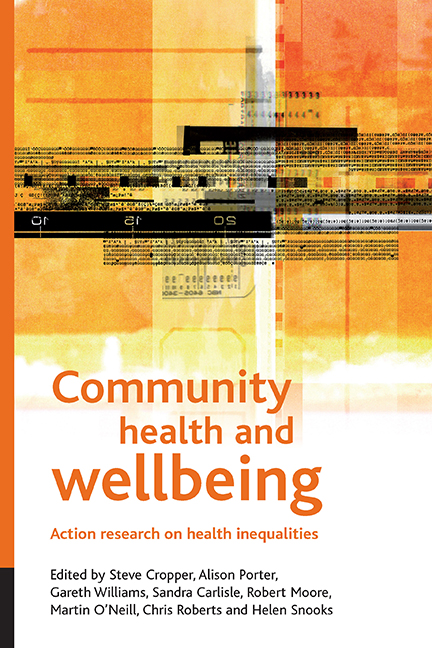Book contents
- Frontmatter
- Contents
- List of tables and figures
- Preface
- Acknowledgements
- Notes on contributors
- one Health inequalities in their place
- two ‘Policy experiments’: policy making, implementation and learning
- three Policy innovation to tackle health inequalities
- four Action research partnerships: contributing to evidence and intelligent change
- five Engaging with communities
- six The role of the community-based action researcher
- seven Evaluation, evidence and learning in community-based action research
- eight Social theory, social policy and sustainable communities
- nine Beyond the experimenting society
- Index
- SHARP DVD: A Way of Working Together to Improve Our Lives
six - The role of the community-based action researcher
Published online by Cambridge University Press: 15 September 2022
- Frontmatter
- Contents
- List of tables and figures
- Preface
- Acknowledgements
- Notes on contributors
- one Health inequalities in their place
- two ‘Policy experiments’: policy making, implementation and learning
- three Policy innovation to tackle health inequalities
- four Action research partnerships: contributing to evidence and intelligent change
- five Engaging with communities
- six The role of the community-based action researcher
- seven Evaluation, evidence and learning in community-based action research
- eight Social theory, social policy and sustainable communities
- nine Beyond the experimenting society
- Index
- SHARP DVD: A Way of Working Together to Improve Our Lives
Summary
Introduction
The value and importance of involving communities in the development and delivery of policies that affect them is increasingly being recognised, and this is reflected in policy directives (Welsh Office, 1998; DH, 2001). Throughout the development of the Sustainable Health Action Research Programme (SHARP), there was an emphasis on involving communities substantially and directly in an action research process aimed at tackling the health and wellbeing issues they faced. In Chapter Five, Bronwen Bermingham and Alison Porter set out some of SHARP's learning about working with communities. This chapter focuses on one particular way in which projects sought to engage communities in the action research process and discusses the role and experiences of community-based action researchers (CBARs).
The classic model of action research advocates that participants engage in an ongoing iterative, cyclical or ‘helical’ process of action and reflection/evaluation that then informs practice (Kemmis and McTaggart, 2000). In theory, such an approach to participatory research should be characterised by openness to change and acceptance of an unpredictability of outcomes. The approach is also generally taken to imply the active participation of research ‘subjects’ in decisions about research questions, design and conduct (Cornwall and Jewkes, 1995; Boutilier et al, 1997; Dick, 1999; Stoecker, 2003); in these, ‘indigenous proficiencies’ are valued (Ansari et al, 2002). Yet, as much of the literature on participatory forms of research with communities makes clear, primary responsibility tends to remain within the academic and/or professional community (Lindsey and McGuiness, 1998; Cheadle et al, 2002; Krieger et al, 2002; Schultz et al, 2002; Mumford et al, 2003; Savan, 2004). Within much of the literature in the field, there appears to be little reference to the role of the lay researcher other than as a data collector, as a ‘research associate’, or, when academic researchers work with other language communities, as an ‘interpreter’ (Jones and Allebone, 1999).
Although there were a number of variations on the model of action developed within SHARP, this chapter draws on the experience of three of the projects – Barefoot, Triangle and Pembrokeshire – that either employed, or engaged on a voluntary basis, members of communities who were then intimately involved in developing action research within their community.
- Type
- Chapter
- Information
- Community Health and WellbeingAction Research on Health Inequalities, pp. 129 - 146Publisher: Bristol University PressPrint publication year: 2007



